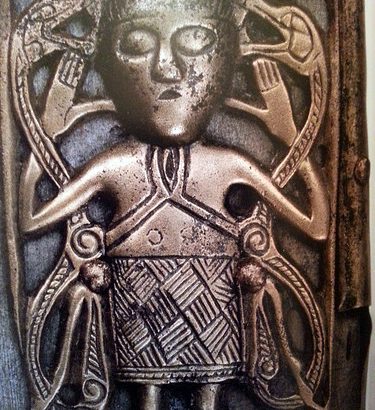Archives | State Papers
Secrets of the powers that be
Early in 1987 the staff of the national Museum in Dublin became aware of an effort by a set of individuals in Ireland and the US to sell on a medieval artefact found in a lake in Roscommon.
This was what is now called the Tully Processional Cross, a rival to the Cross of Cong, the only two crosses of their kind to survive. The metal parts from which the wooden staff had rotted away were found by divers on the bed of Lake Tully.
With the help of a lady friends in the US, Rosemary G—- (of Everett, Massachusetts) , the finders hoped to sell the pieces of the cross to the J. P. Getty Museum in Brentwood California. The suggested price hoped for was one and three quarter million US dollars. This was in a letter to the curator of the museum. Ms G—- sent him, aside from a letter written oddly on lined paper taken from a jotter pad, two very poor and indistinct photographs.
No interest
The curator told them the items were of no interest to the Getty. Later he told the National Museum that he received perhaps 19 or 20 such letters a day, from people offering antiquities to the museum, which (according to its website), “seeks to inspire curiosity about, and enjoyment and understanding of the visual arts by collecting, conserving, exhibiting, and interpreting works of art of outstanding quality and historical importance.” One division of the museum displays, among other things, art from the middle ages.
It is an institution with a shadowy reputation for dealing in stolen art works with a fund of US$1.2 billion. It is inevitably an attraction to the dubious people who haunt the higher echelons of the art business.
Surprises
The National Museum eventually came into possession of the Tully cross (as related last year in these pages), but the attempted transaction with the Getty revealed in this year’s release still surprises. The full name of the lady who approached the Getty can be read in the papers [file 2017/4/6623] but the libel laws being what they are in this country it will not be given here.
And perhaps it would better too that those who plunder our antiquities and attempt to sell them for the highest commercial price should not be further characterised.
However, both the state and the museum recognised that unless finders were rewarded with something approaching the market value, as was the case with the Derrynaflan Hoard [File 2017/2/73] historically important items would be lost in privates hands, forever shorn of any exact knowledge of where they were found. And that would a tragedy for science and scholarship.
[File 2017 / 4 / 6623]


 Peter Costello
Peter Costello
